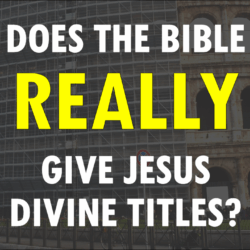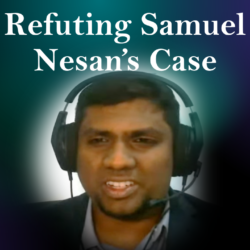Does the New Testament refer to Jesus as God? Though this is an important question, it’s only a starting point for wrestling with who Jesus is. In what follows we’ll consider the evidence from five scholars on what texts they say attribute deity to Christ. Then we’ll examine the biblical evidence that pulls in the opposite direction, suggesting that Jesus was not God. Lastly, we’ll examine five major possibilities for interpreting this data, including trinitarianism, modalism, Arianism, Greco-Roman polytheism, and biblical unitarianism.
Listen to this episode on Spotify or Apple Podcasts
—— Links ——
- Get the transcript of this episode
- Also see Five Major Problems with the Trinity
- Support Restitutio by donating here
- Join our Restitutio Facebook Group and follow Sean Finnegan on Twitter @RestitutioSF
- Leave a voice message via SpeakPipe with questions or comments and we may play them out on the air
- Intro music: Good Vibes by MBB Attribution-ShareAlike 3.0 Unported (CC BY-SA 3.0) Free Download / Stream: Music promoted by Audio Library.
- Who is Sean Finnegan? Read his bio here
- Get Finnegan’s book, Kingdom Journey to learn about God’s kingdom coming on earth as well as the story of how Christianity lost this precious pearl of great price.







Sean, this is a very helpful presentation demonstrating the strength of the biblical unitarian case to be the best explanation of the overall biblical narrative. My one suggestion is to look carefully at Bill Schlegel’s episodes on Hebrews 1:8 and John 20:28. Although you alluded to the type of positions he presents, you opted for the view that both passages likely refer to Jesus as God, but in a lesser sense of “theos”. However, I think Bill presents a strong case that neither of these verses refer to Jesus as God. I think this actually leaves the references to Jesus as God in the N..T. at zero. I think Bill’s podcast on John 20:28 is an amazing tour de force on this verse. I would only add to it that if Granville Sharp’s rule has any validity, John 20:28 shows “my Lord” and “my God” to be separate persons here. But in the places they use it to prove the deity of Christ, it would actually show God and Jesus to be the same person (modalism) — not the same essence, nature, or being (Trinitarianism).
Hebrews 1:8-14 – Is the Son called God? Did Jesus create the heavens?
https://www.listennotes.com/podcasts/one-god-report/13-hebrews-18-14-is-the-son-QDsNEZLTxXh/
John 20:28 – My Lord and My God: Trinitarians Get it Wrong
https://www.listennotes.com/podcasts/one-god-report/9-my-lord-and-my-god-nopixDZEGjU/
Hi, many times I hear people explain away Titus 2:13 (calling Jesus God) but seem to miss the point of the verse in my opinion. Please see this short Substack for how I think we should explain it.
https://dfinster.substack.com/p/why-titus-213-doesnt-call-jesus-god
Sean, I always enjoy your presentations. I am a recent convert to Biblical unitarianism based largely on your talks among other readings during my search for truth. You made the statement that you do not believe in the “deity of Christ.” May I suggest you reconsider that position. Below is the opening paragraph to Chapter 13 of my book. In this chapter I discuss the misuse of the definitions of “deity” and “divine.”
“DEITY OF THE MESSIAH
-ORIGINS-
The topic of the deity of Christ is connected to the pagan tradition of the trinity. The connection of these two topics is due to the inaccurate use of “deity” to somehow mean “the same as God.” The definition of “deity” is “divine status, quality, or nature.” “Divine” is defined as “of, from, or like God or a god”. There is only one large “g” God, and that is Jehovah. There are small “g” gods that are referred to in scripture that are associated with Yahweh. However, there are also small “g” gods that are not associated with Elohim and are not on the side of good. Satan is the leader of these. There exists and evil deity and evil divine nature, “of, from, or like a god” – small “g” god – with which we must also contend. Most people will equate “divine” and “deity” only with “good” as that which comes from our Creator God. However, the definition describes entities that are beyond our realm of existence which can be good or bad.”
I go on to make the argument that because Jesus was NOT conceived in sin nor born in iniquity, rather He was conceived sinless and born in purity and holiness as the only human begotten of our Creator, that He possessed a nature, quality or even status that was clearly of, from, or like God. By this definition of the terms used Jesus was and is certainly deity. However, that in no way makes Him equal with Jehovah.
I have no issue stating my belief in the deity of Christ, but I will immediately include this misuse of the terms and use the opportunity to explain who Christ is “deity”, but in no way is equal to His and our Father.
I look forward to hearing your thoughts on my position. I don’t yet have a website, but my book is “Know What You Believe and Why”. There are a few with similar titles. Mine has a cover showing an arm-wrestling match between the heart and mind with the will being the referee. I would welcome your review since I touch on a few other “untouchable” topics.
That was my first question as well John. What is the definition of the word “Deity”? I land close to where you do above? I use the vocabulary.com definition …
https://www.vocabulary.com/dictionary/deity
Using this definition there are a pantheon of gods – mostly bad. Jesus could be described as being elevated to deity after the cross by his Father. Jesus is still not Almighty God, is human, and will always be in submission to his Father. I agree 100% that Jesus never called himself god, both before and after the cross. It is always the “son of God” in deference to his father.
I am challenging the definition of “deity”. It is NOT limited to the only True Almighty God, the Father. It just means having significant power and influence over a significant number of people. For example … The Roman pantheon of gods (fallen angels and Nephilim). Almighty God’s servants are all called “sons of God” or elohim. They also not seeking to replace Almighty God like the fallen ones.
Peter, I think you’re on to something here. Check out this article for more about this: “The Deity of Christ from a Greco-Roman Perspective.” There’s also a video and audio if you prefer, though the article goes into much more detail.
Sean, you mentioned that 40 times in the gospel of John, Jesus is described as being sent by God. I think the count is John the Baptist said it once and Jesus said it 39 times.
Jesus gives the definition of the relationship of the sender to the one sent in John 13:16. “Truly, truly I say to you, a slave is not greater than his master, nor is one who is sent greater than the one who sent him.”
When one considers that the slave is not equal to his master, the parallel is also true the one sent is not equal to the one who sends.
In the thought of a human needed for our sacrifice I have looked at 2 Corinthians 5:21. (NASB 2020, words in [ ] are in italics in the original) He made Him who knew no sin [to be] sin in our behalf, so that we might become the righteousness of God in Him.
Notice the phrase “[to be] sin in our behalf.” God made Jesus to be sin on our behalf. The question I have to ask is, can God be made sin on our behalf?
I believe the answer is, no. Consider a list of verses that describe God as holy and in which He calls on His followers to be holy, too, and God is described as “No evil can dwell with you.” Leviticus 11:44, 45; 19:2; 20:7, 26; 21:8; Psalm 5:4; 1 Peter 1:16. There are many more passages that speak of the holiness of God. I believe it is safe to conclude that God cannot “be sin on our behalf” because of His holiness. Therefore, only a man could be made sin on our behalf, “so that we might become the righteousness of God in Him.” Only a man could die for our sins.
The same argument could be made for Galatians 3:13, 14. (NASB 2020) 13 Christ redeemed us from the curse of the Law, having become a curse for us—for it is written: “CURSED IS EVERYONE WHO HANGS ON A TREE”—
and
1 Peter 2:21-24. (NASB 2020, words in [ ] are in italics in the original.)
21 For you have been called for this purpose, because Christ also suffered for you, leaving you an example, so that you would follow in His steps, 22 [HE] WHO COMMITTED NO sin, NOR WAS ANY DECEIT found IN HIS MOUTH; 23 and while being abusively insulted, He did not insult in return; while suffering, He did not threaten, but kept entrusting [Himself] to Him who judges righteously; 24 and He Himself brought our sins in His body up on the cross, so that we might die to sin and live for righteousness; by His wounds you were healed.
God could not become a curse for us because of His holiness.
God could not bring our sins in his body up on the cross because of His holiness.
Dear Sean,
It is refreshing to listen to a person who is committed to be biblical and tries to see the bible closely without using any theological lenses. Biblical unitarianism is interesting to me since I do have problem with the doctrine of trinity not being supported by any direct verses in the Bible. In many ways, my understanding of the bible closely conformed to the Biblical Unitarianism except for the one discussed in this particular podcast about the deity of Christ.
I understand that you want to be honest with the biblical data and present 5 options after having pro and contra data supporting the deity of Christ. I believe that there is another option that is fully supported by biblical data which I will present to you in a moment.
However, I want to clear up the idea of “deity of Christ”. While I understand that you present the data mostly pro or against the understanding of “deity” as in the doctrine of trinity, I think “deity” could also refer to the status of Christ as being more than just human or even angel or even as a God. (that is polytheism that I might refer later in my explanation). Can Jesus be just a perfect human being who was created by the Father God for the purpose of being the Lamb of God or can Jesus have preexistence with God before His birth without Him being equal with the Father? Can Jesus be the Son of God who was with God from the beginning and that everything was made by God the Father thru Jesus? If it is possible, then what kind of God was Jesus?
My understanding of man/woman is that there is a human spirit that occupies the body. That is what defines a human being. What is the kind of body that we have? Can God’s spirit come to live in the body of a human being? Why not? The Holy Spirit can come to live in the lives of the believers. But if the Son of God (Jesus) who is a spirit and come to live as a baby person Jesus, is he still human? Of course he is pretty much a human being with the human emotions and human needs. Especially when the Son of God had given up His Godhood (attributes of power etc) (kenosis) to be a baby person. Here God is living among us as a baby with the limitation of a human being, but His Spirit is divine. I believe this is possible and this is my understanding of the humanity and divinity of Jesus. He was of course fully human and yet with the divine Spirit inside him.
This is the option that I want to present to you. Jesus is a human being with the divine Spirit (who was with God from the beginning). This option fit well with understanding John 1:1 and many other passages concerning Jesus.
The Son of God was with the Father from the beginning.
The Son of God was the Logos.
The Father created everything thru Logos.
The Logos came to His creation as a human being.
Suddenly, a lot of data from the Gospels and the epistles come together in harmony as pieces of jigsaw puzzle fit together presenting a beautiful picture of the plan of God.
Why can’t Jesus be just a human being with just a human spirit created by the Father God to be a perfect lamb to save the world?
– He lived a perfect life without sin. Though this did not prove that Jesus was God, it did prove that Jesus was a special person doing what no other person had done before.
– He had to be the sacrifice offering. Why? Jesus asked the Father to let the cup passed from him. However, it was the only way to save the humanity. Only Jesus can the world. Why? Why couldn’t God just create another perfect human being as a sacrifice or maybe many other perfect human beings? Only the Son of God who was divine could save the world. Only His blood was enough to redeem the sin of the world.
Now, who was Jesus really before He came to earth as the messiah? Here I must refer back to the commitment to stay biblical meaning while we can deduce what the Bible is implying, there are some things left unanswered. When we look at the Gospels and the epistles, the apostles knew about God the Father who is God over all. They also knew about the Lord and King Jesus who is at the right hand of God. So, who was Jesus before? Was Jesus another God or the Angel of the Lord from OT? They the apostles left the tension unanswered and left it at that. Perhaps it is wise for us not to go beyond what the Bible is saying and leave it there. After all, what is a man who can understand things about God?
However, by saying that Jesus was just a fully perfect human being, I think biblical unitarianism face some problems explaining certain texts in the epistles concerning preexistence of Jesus. While it might be wise not to start our theology from there, those passages should also part of the building blocks of our theology.